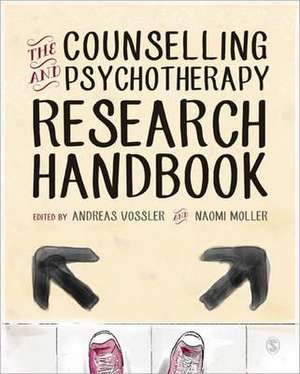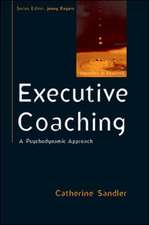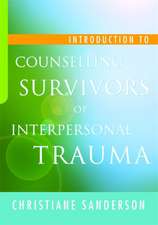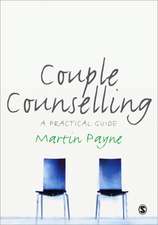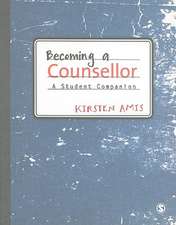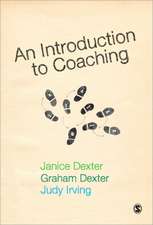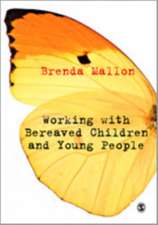The Counselling and Psychotherapy Research Handbook
Editat de Andreas Vossler, Naomi Molleren Limba Engleză Paperback – 15 oct 2014
Breaking down this seemingly mountainous task into easy to swallow pieces, this book will navigate your students through each stage of the research process, from choosing a research question, through the pros and cons of different methods, to data analysis and writing up their findings.
Written by leading contributors from the field including John McLeod, Mick Cooper and Tim Bond, each chapter features points for reflection, engaging activities and suggestions for further reading, helping students to engage with all aspects of research. An original graphic narrative runs throughout the book, bringing this complex topic to life in a unique way.
Whether embarking on research for the first time or already a little familiar with research and research methods, this unique guide is something counselling and psychotherapy students will turn to continually throughout their research projects.
| Toate formatele și edițiile | Preț | Express |
|---|---|---|
| Paperback (1) | 377.73 lei 3-5 săpt. | +30.15 lei 4-10 zile |
| SAGE Publications – 15 oct 2014 | 377.73 lei 3-5 săpt. | +30.15 lei 4-10 zile |
| Hardback (1) | 971.64 lei 6-8 săpt. | |
| SAGE Publications – 15 oct 2014 | 971.64 lei 6-8 săpt. |
Preț: 377.73 lei
Nou
Puncte Express: 567
Preț estimativ în valută:
72.29€ • 74.68$ • 60.16£
72.29€ • 74.68$ • 60.16£
Carte disponibilă
Livrare economică 04-18 martie
Livrare express 15-21 februarie pentru 40.14 lei
Preluare comenzi: 021 569.72.76
Specificații
ISBN-13: 9781446255278
ISBN-10: 1446255271
Pagini: 320
Dimensiuni: 186 x 232 x 17 mm
Greutate: 0.57 kg
Ediția:New.
Editura: SAGE Publications
Colecția Sage Publications Ltd
Locul publicării:London, United Kingdom
ISBN-10: 1446255271
Pagini: 320
Dimensiuni: 186 x 232 x 17 mm
Greutate: 0.57 kg
Ediția:New.
Editura: SAGE Publications
Colecția Sage Publications Ltd
Locul publicării:London, United Kingdom
Recenzii
The editors of this book have assembled contributions from key authors who explain comprehensively the rationales for research and methods of conducting it, in accessible language that invites readers to overcome anxieties and doubts about using research. Vossler and Moller's Handbook deserves to become the authoritative resource for practitioners and students of counselling and psychotherapy.
I think this is a most impressive text. The language employed is plain, accessible and inclusive and the editors have skilfully produced a coherent narrative without losing the distinctive voices of individual contributors. This will without doubt become required reading for anyone – novice or seasoned practitioner – who seeks a wise companion on their own research journey.
In an era of “big data” and evidence based practice, this book provides students and practitioners with an engaging and informative way into the world of counselling and psychotherapy research. It is essential reading for those starting to make sense of and engage in empirical study.
There have been plenty of publications on research as well as on training in counselling and psychotherapy. This wonderful handbook brings them together for the first time. It is a landmark publication: a comprehensive overview and a didactically excellent journey through the research process guided by experienced, well-known researchers. Research questions and planning; designs; methodologies and methods; organization and dissemination are discussed. It is ambitious but provides easily accessible expertise for students, practitioners and young researchers. It will have a large international impact on counselling and psychotherapy training and on the scientist-practitioner self concept of counsellors and psychotherapists.
In true ‘handbook’ style, this engaging, comprehensive and motivational publication can be used as an exemplary reference tool throughout the research process. I would definitely recommend it to students, educators and researchers alike. Although it is intended primarily for students, there is much in its content for trainers and educators too.
This book left me feeling excited and enthusiastic about conducting research - something I have not felt previously. It is a must for all students and practitioners. Whether you have no knowledge at all, or limited experience in research, this book fills the gap.
In this research handbook, attempts are made to enable the reader to overcome 'internal' hurdles to research...The reader is led through some very practical stages, from deciding on a research topic, to focusing down the research question, to deciding on the method...to conducting a literature review and data analysis, to becoming aware of ethical issues, to writing-up and dissemination. A strength of the book is that it is written by both relatively new, and many seasoned researchers- each drawing on their past and current experience. This significantly adds 'texture' to the relevance and accessibility of the material...this is now a book I will be highly recommending that all of my research students have in their personal libraries, to refer to constantly throughout their research process.
I think this is a most impressive text. The language employed is plain, accessible and inclusive and the editors have skilfully produced a coherent narrative without losing the distinctive voices of individual contributors. This will without doubt become required reading for anyone – novice or seasoned practitioner – who seeks a wise companion on their own research journey.
In an era of “big data” and evidence based practice, this book provides students and practitioners with an engaging and informative way into the world of counselling and psychotherapy research. It is essential reading for those starting to make sense of and engage in empirical study.
There have been plenty of publications on research as well as on training in counselling and psychotherapy. This wonderful handbook brings them together for the first time. It is a landmark publication: a comprehensive overview and a didactically excellent journey through the research process guided by experienced, well-known researchers. Research questions and planning; designs; methodologies and methods; organization and dissemination are discussed. It is ambitious but provides easily accessible expertise for students, practitioners and young researchers. It will have a large international impact on counselling and psychotherapy training and on the scientist-practitioner self concept of counsellors and psychotherapists.
In true ‘handbook’ style, this engaging, comprehensive and motivational publication can be used as an exemplary reference tool throughout the research process. I would definitely recommend it to students, educators and researchers alike. Although it is intended primarily for students, there is much in its content for trainers and educators too.
This book left me feeling excited and enthusiastic about conducting research - something I have not felt previously. It is a must for all students and practitioners. Whether you have no knowledge at all, or limited experience in research, this book fills the gap.
In this research handbook, attempts are made to enable the reader to overcome 'internal' hurdles to research...The reader is led through some very practical stages, from deciding on a research topic, to focusing down the research question, to deciding on the method...to conducting a literature review and data analysis, to becoming aware of ethical issues, to writing-up and dissemination. A strength of the book is that it is written by both relatively new, and many seasoned researchers- each drawing on their past and current experience. This significantly adds 'texture' to the relevance and accessibility of the material...this is now a book I will be highly recommending that all of my research students have in their personal libraries, to refer to constantly throughout their research process.
Cuprins
Introduction
Setting the scene – Why research matters - Andreas Vossler, Naomi Moller & Mick Cooper
Attitudes to and perceptions of research - Andreas Vossler & Naomi Moller
Beginning the research journey
Choosing a research question - Elaine Kasket
How to read and understand research - Elena Gil-Rodiguez
Doing a literature review - Meg Barker
Introduction to research methodology - Ladislav Timulak
Planning your research: Design, method and sample - Terry Hanley, Clodagh Jordan & Kasia Wilk
Ethical considerations - Tim Bond
Writing a research proposal - Mark Donati
Methodologies and methods for doing research
Quantitative methods - Elspeth Twigg
How to use t-tests to explore pre-post change - Elspeth Twigg & Paul Redford
Qualitative methods - Linda Finlay
How to use thematic analysis with interview data - Virginia Braun, Victoria Clarke & Nicola Rance
Case studies methodologies - Julia McLeod, Mhairi Thurston & John McLeod
How to use case study methodology with single client therapy data - Mhairi Thurston, Julia McLeod & John McLeod
Completing the research journey
Dissemination of research - Andrew Reeves
Student top tips - Brian Sreenan, Harriet Smith & Charles Frost
Next steps – Building on and using research in training and practice - Peter Stratton, Naomi Moller & Andreas Vossler
Setting the scene – Why research matters - Andreas Vossler, Naomi Moller & Mick Cooper
Attitudes to and perceptions of research - Andreas Vossler & Naomi Moller
Beginning the research journey
Choosing a research question - Elaine Kasket
How to read and understand research - Elena Gil-Rodiguez
Doing a literature review - Meg Barker
Introduction to research methodology - Ladislav Timulak
Planning your research: Design, method and sample - Terry Hanley, Clodagh Jordan & Kasia Wilk
Ethical considerations - Tim Bond
Writing a research proposal - Mark Donati
Methodologies and methods for doing research
Quantitative methods - Elspeth Twigg
How to use t-tests to explore pre-post change - Elspeth Twigg & Paul Redford
Qualitative methods - Linda Finlay
How to use thematic analysis with interview data - Virginia Braun, Victoria Clarke & Nicola Rance
Case studies methodologies - Julia McLeod, Mhairi Thurston & John McLeod
How to use case study methodology with single client therapy data - Mhairi Thurston, Julia McLeod & John McLeod
Completing the research journey
Dissemination of research - Andrew Reeves
Student top tips - Brian Sreenan, Harriet Smith & Charles Frost
Next steps – Building on and using research in training and practice - Peter Stratton, Naomi Moller & Andreas Vossler
Descriere
'In an era of “big data” and evidence based practice, this book provides students and practitioners with an engaging and informative way into the world of counselling and psychotherapy research. It is essential reading for those starting to make sense of and engage in empirical study' - Andy Hill, Head of Research, BACP
